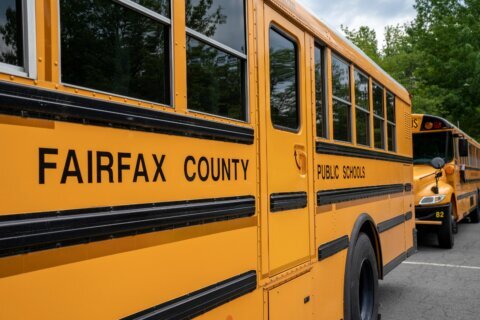As soon as one winter ends, Fairfax County’s Department of Public Works and Environmental Services immediately turns its attention to the next one.
When what’s considered “the offseason” begins, workers conduct hot washes, making sure vehicles in the fleet don’t have any lingering salt on them. Because the fiscal year starts in July, the agency has to anticipate what its needs will be well in advance, to ensure it’s included in and approved through the county’s budget process. Then, the equipment has to be serviced and repaired, and some of it gets sold.
The agency starts to buy new things, too, such as material spreaders, plows, brine sprayers, trucks, shovels and brooms.
While snow flurries made their way through the D.C. region on Friday, with more snow expected on Sunday night into Monday, the agency’s proactive approach allows it to respond to conditions in real time. Much of that effort happens in the spring and fall.
“We’re planning for snow all year round,” said Chad Crawford, director of the maintenance and stormwater management division of Fairfax County’s Department of Public Works and Environmental Services.
“The springtime is a big time for starting to reset, and it continues through the summer, and it really speeds up in the fall.”
During the offseason, the agency also stocks up on materials, like rock salt. The county can store 6,500 tons between two salt domes, a spokeswoman told WTOP. It can similarly store 300 tons of a salt and sand mix.
Salt brine is also made during the offseason, and the county makes 1,000 gallons an hour and holds 6,000 gallons in tanks.
The country tries to buy its materials “when the demand is low,” Crawford said.
In the period the agency considers “the preseason,” workers install equipment and conduct final checks. That’s also the time when drivers and operators are trained, which Crawford described as essential because, “historically, what’s been in our forefront for the last five years, is understanding how to do snow operations in an environmentally-friendly fashion.”
“We have to train people on why application of salt in a very measured way is important,” Crawford said.
Before winter begins, the agency puts 300 self-help barrels at different locations across the county. Each of the barrels is filled with 225 pounds of the 50/50 salt and sand mixture.
“That’s so that people can actually do some of the treatment if they see a problem that we missed,” Crawford said.
“It’s a rather large county of about 400 square miles, and we’re not able to, just at the drop of the hat, run out to one given area just because there’s one icy spot. And so, people are able to help themselves and put down salt.”
Workers also “install snow pegs, so the drivers know where the inlets are. They know where the curb lines are, and they know where they’re able to push the snow,” Crawford said.
The agency uses checklists and has a series of meetings to discuss what the winter forecast might look like. The off-season planning allows workers to focus on responding to individual weather events as they pop up.
Before what’s considered “a winter weather event” happens, leaders schedule 12-hour shifts to ensure there’s coverage around the clock. They organize meals for about 65 staff members, and make sure lodging is arranged for staff members to safely rest and then return to work as needed.
“If you don’t put them up in a hotel room in a big event, they go home, and then they get they get snowed in, and they can’t come back, and then that doesn’t leave us anywhere,” Crawford said.
Many of Fairfax County’s roads are treated by Virginia’s Department of Transportation, and during snow events, the agency emphasizes keeping travel paths open for police, fire departments and hospitals. When the snow stops, they clear those facilities, and then work through other areas, such as libraries or businesses.
When winter weather exits the region, Crawford said workers come together to discuss “what went well, what didn’t go so well, and to make corrections during a season.”
Get breaking news and daily headlines delivered to your email inbox by signing up here.
© 2025 WTOP. All Rights Reserved. This website is not intended for users located within the European Economic Area.








